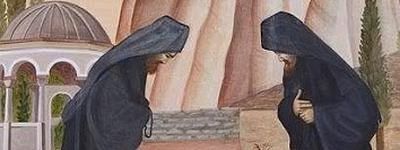

| Previous day | Next day |
| Old Style
March 4
|
Sunday |
New Style
March 17
|
| Cheese-fare Week—no meat; fish and dairy allowed. Cheese-fare (Forgiveness) Sunday. Tone 8. | Cheese-fare Week—no meat.
|
![]() St. Gerasimus of the Jordan (451). St. Gerasimus of Vologda, founder of the Holy Trinity Monastery (1178). St. Daniel, great prince of Moscow (1303).
St. Gerasimus of the Jordan (451). St. Gerasimus of Vologda, founder of the Holy Trinity Monastery (1178). St. Daniel, great prince of Moscow (1303).
Martyrs Paul and his sister Juliana, and Quadratus, Acacius, and Stratonicus, at Ptolemais in Syria (ca. 273). St. James the Faster, of Phoenicia (Syria) (6th c.). Translation of the relics of Martyr Wenceslaus (Vyacheslav), prince of the Czechs (929-935). Blessed Basil (Vasilko), prince of Rostov (1238). Saints of Pskov martyred by the Latins: St. Ioasaph of Snetogorsk Monastery and St. Basil of Mirozh Monastery (1299). St. Gregory, bishop of Constantia on Cyprus. St. Peter (Michurin) of Tomsk (Siberia) (1820).
New Hieromartyrs Archpriest Dimitry Ivanov of Kiev (1933) and Priest Vyacheslav Leontiev of Nizhegorod (1937).
St. Julian, bishop of Alexandria (189). St. Gregory, bishop of Assos near Ephesus (1150). New Martyr John of al-Sindiyana (Palestine) (1937).
Repose of Schemamonk Mark of Glinsk Hermitage (1893) and Schemanun Agnia (Starodubtseva), eldress, of Karaganda (1976).
Thoughts for Each Day of the Year
According to the Daily Church Readings from the Word of God
By St. Theophan the Recluse

Cheese-fare Sunday. [Rom. 13:11–14:4; Matt. 6:14–21]
For if ye forgive men their trespasses, your Heavenly Father will also forgive you; But if ye forgive not men their trespasses, neither will your Father forgive your trespasses (Matt. 6:14–15). What a simple and handy means of salvation! Your trespasses are forgiven under the condition that you forgive the trespasses of your neighbour against you. This means that you are in your own hands. Force yourself to pass from agitated feelings toward your brother to truly peaceful feelings—and that is all. Forgiveness day—what a great heavenly day of God this is! If all of us used it as we ought, this day would make Christian societies into heavenly societies, and the earth would merge with heaven.
Articles
 Right-believing Prince Daniel of MoscowHoly Prince Daniel of Moscow was born at Vladimir in the year 1261. He was the fourth son of St Alexander Nevsky. |
 The Holy Martyr Paul and his sister JulianaThe Holy Martyr Paul and his sister Juliana were executed under the emperor Aurelian (270-275) in the Phoenician city of Ptolemais. |
 St. James the Faster of Phoenicia, SyriaSaint James the Faster lived a life of asceticism near the Phoenician city of Porphyrion in the sixth century. |
 Forgiveness Sunday |








